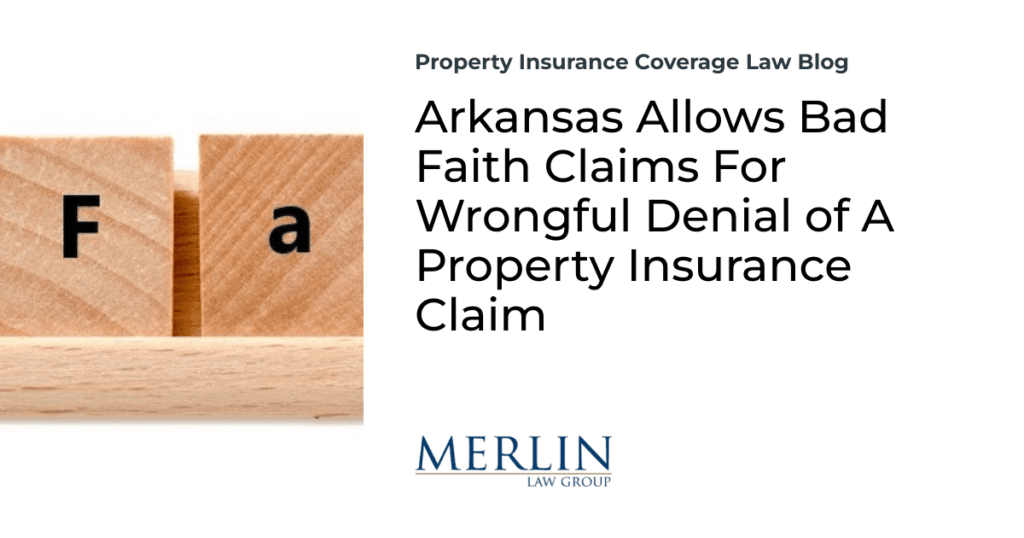Arkansas Allows Bad Faith Claims For Wrongful Denial of A Property Insurance Claim

An insurer in Arkansas who wrongfully denies a property insurance claim and fails to act in good faith can be subject to a bad faith lawsuit. An article in the Arkansas Law Review, A Survey of Bad Faith Insurance Tort Cases in Arkansas,1 noted the Arkansas first-party bad faith law:
First-party bad faith developed as an extension of the third-party bad-faith doctrine and has been recognized in Arkansas since at least as early as 1984. The purpose of recognizing the tort was to provide additional remedies for intentional misconduct. First-party bad faith represents a violation of an insurance company’s duty to exercise ‘due care and strict performance and utmost good faith,’ and it occurs when an insurance company affirmatively engages in dishonest, malicious, or oppressive conduct in order to avoid a just obligation to the insured; this is sometimes characterized as hatred, ill will, or a spirit of revenge in older or more egregious cases. ‘Bad-faith law does not define the terms of the insurance contract; instead, it concerns whether and how the insurance company abides by the terms of the contract.’ If the insurer does not abide by the insurance contract in good faith, then the law provides remedies, including punitive damages. There are many examples in Arkansas cases of what does and does not constitute bad faith.
An element of scienter is required to prove first-party bad faith. Proof of an actual intent to engage in dishonest conduct to avoid a just obligation to an insured will substantiate a claim of first-party bad faith. Willful blindness also provides the requisite scienter. Finally, proof of reckless indifference may also serve to meet the scienter requirement, as reckless indifference can give rise to punitive damages.
The burden to prove bad faith may not be easy, as one court stated:
The Court now turns to Plaintiffs’ tort of bad faith claim. The standard for establishing a claim for bad faith on the part of an insurance company is rigorous and difficult to satisfy…In order to state a claim for bad faith, a claimant must allege that the defendant insurance company engaged in affirmative misconduct that was dishonest, malicious, or oppressive…. ‘[B]ad faith’ is defined as ‘dishonest, malicious, or oppressive conduct carried out with a state of mind characterized by hatred, ill will, or a spirit of revenge.’ Negligence, bad judgment, nightmarish red tape, hardball, delaying investigations for months, and failure to provide a reason for the company’s initial refusal of payment does not constitute bad faith.2
Hardball and wrongful delay are certainly evidence of a failure to act in good faith. All insurance companies would agree. So, it is hard to reconcile the rhetoric found in this case because it defines bad faith as what insurance adjusters are taught not to do.
The bottom line is that Arkansas recognizes first-party bad faith cases. However, proving what Arkansas judges think constitutes bad faith may be a higher standard than what insurance adjusters are taught bad faith conduct is.
Thought For The Day
Treat those who are good with goodness, and also treat those who are not good with goodness. Thus goodness is attained. Be honest to those who are honest, and be also honest to those who are not honest. Thus honesty is attained.
—Lao Tzu
1 Nathan Price Chaney, A Survey of Bad Faith Insurance Tort Cases in Arkansas, 64 Ark. L. Rev. 853 (2011).
2 Bryant v. State Farm Fire & Cas. Co., No. 3:12-cv-00147, 2013 U.S. Dist. LEXIS 50883, 2013 WL 1445482 (E.D. Ark. Apr. 9, 2013).



